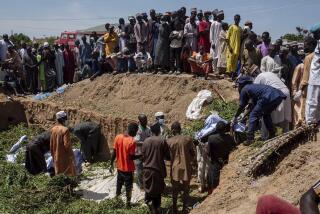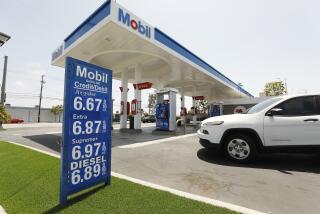Patience Runs Out Along With Gas
KADUNA, Nigeria â Tough times call for Nigerian ingenuity. So when lines in front of gas stations began to stretch for miles, Tunje Oke decided to leave his job as a taxi driver to become a black marketer of gas.
Oke got a friend to install an additional 50-gallon gas tank in the trunk of his car. When he fills up at the pump, the 38-year-old father of four can see his investments multiply tenfold.
Oke is not the only one jumping into the gas business. Michael Obaseki found a place in a gas line the other day for his 1975 Peugeot, which hasnât worked in more than a decade. With the help of friends, Obaseki pushed the rusty car to the pump, filled up, then siphoned the gasoline to retail it in front of the same gas station that supplied him.
Across this West African nation, which boasts of being one of the worldâs largest exporters of oil, motorists are lining up for as much as three days to fill their tanks. And President Olusegun Obasanjo, who won reelection last week, has warned that gas prices, which are regulated here, could be hiked, since many Nigerians seem willing to pay higher rates on the black market.
During his campaign, Obasanjo trumpeted the end of military-era gas lines as one of his key achievements. But in February, the queues began snaking again down the sides of Nigeriaâs already choked roads.
Obasanjo and other government officials blame the nationwide shortage of gas on several factors, including technical problems at four refineries that process Nigerian crude for the domestic market. Nigeria -- which exports 2 million barrels of crude a day and is the fifth-largest U.S. supplier -- also relies on imported gasoline for its own people. When international supplies ran low recently, Nigerians were among the first to feel the pinch, officials here say. And unrest in the Niger Delta region, the source of nearly all of the nationâs crude, has led to panic buying.
Such anxiety grew Tuesday after authorities confirmed that 97 foreign workers -- including 21 Americans -- have been held hostage since April 19 on four oil rigs hijacked by their striking Nigerian colleagues.
Although hostage takings by militants and community activists are relatively common in the delta, the captives are rarely harmed. But Nigerians worry that any violence or sabotage of oil facilities could make their lives more difficult and their gas queues even longer.
The long lines that began to form in February recalled the military dictatorship of Gen. Sani Abacha, when finding fuel could be a weeklong ordeal.
âThe ghost of Sani Abacha is coming to haunt us,â said Olivia Abudu, who was waiting in a line in the northern city of Kaduna last week. âWe donât know why we have to suffer so while people in Texas, London and all over Africa are filling up their tanks with our gas.â
Mahmoud Issah, who was at the end of the line inside his ambulance, said he planned to leave it overnight and rejoin the queue the next day, when the gas station was expected to receive new supplies.
âIf we donât have gas, we canât take sick people to the hospital,â he said. âIf this continues, weâll have to use donkeys and mules.â
Abudu planned to fill her tank and three 25-liter red plastic jerrycans she had in her trunk; each can holds a little more than 6 gallons. Gas station owners tell their attendants not to sell gas in jerrycans, but a 500-naira bill, or roughly $4, can sway the workers. Drivers like Abudu often stock up on spare fuel because if they donât, it can take hours or days to obtain more.
Such foresight can be dangerous, however. Authorities here have been warning motorists not to keep jerrycans of gas in their cars after about 30 people were incinerated this month in a spectacular traffic accident. Two vehicles crashed, sparking a fireball that triggered a chain reaction involving 13 other vehicles on a highway between Lagos, the commercial capital, and the southwestern city of Ibadan. Most of the drivers were carrying extra fuel in their cars.
In some regions, gas lines have been the scenes of fistfights and chaos -- even killings. Earlier this month, an enraged policeman shot to death two motorists who told him he should take his turn and not jump ahead of others waiting for fuel in the southern city of Asaba. After the shooting, other angry motorists in the queue beat the officer to death.
In Nigeria, where about 70% of the population earn less than $1 a day, thousands of people also take advantage of gas shortages. Jobless youths, known as area boys, extort up to $2 from motorists who line up in their neighborhoods. Gas station owners routinely divert gasoline tankers to black marketers who will pay premium prices for the entire load.
Meantime, street vendors hawking mangoes, handicrafts and food have added gas to their list of items for sale.
The official price here is about 20 cents a liter, about 80 cents a gallon, but many motorists now pay 10 times that to avoid waiting in line.
âItâs killing my business,â said Mahmoud Sani, who runs a rental car business in Kaduna. âBut if we donât buy on the black market, our cars will not be working but waiting in lines.â
Even ordinary Nigerians are cashing in. Soldiers, police officers and government officials are among the people buying and reselling gas.
Last week, men driving cars with government license plates traded barrels of gasoline in the parking lot of the Public Enlightenment Department, an arm of the Independent Corrupt Practices and Other Related Offenses Commission.
The activities seemed to irk Mike Sowe, the head of the agency, which sponsors anti-corruption campaigns.
Noting that Nigeria recently helped Liberia and other troubled neighbors with their affairs, Sowe said: âIn Nigeria, we export what we donât have -- democracy -- and import what we have -- fuel.â
Government officials have ordered independent marketers to send all available gasoline to filling stations, not black marketers. But even Obasanjo said he knows that could be a difficult assignment.
âEven if you make police follow the tankers, they give the [officer] say 10,000 naira [roughly $80], and the police jumps down to say, âBye-bye.â They wonât know where the tanker has gone,â he said.
It was in that interview that Obasanjo, who has appointed a panel to probe the fuel shortages, said that one solution would be to raise gas prices. Because gasoline in neighboring Benin, Togo and Ghana can fetch up to three times the controlled price in Nigeria, marketers have been motivated to smuggle fuel to those countries.
But any effort to raise gas prices would be met with widespread protests, analysts say, noting that previous price increases triggered bloody riots.
Said Abudu, the motorist waiting to buy gas in Kaduna: âObasanjo should focus on putting money in the pockets of poor Nigerians, not grabbing from the needy.â
More to Read
Sign up for Essential California
The most important California stories and recommendations in your inbox every morning.
You may occasionally receive promotional content from the Los Angeles Times.










